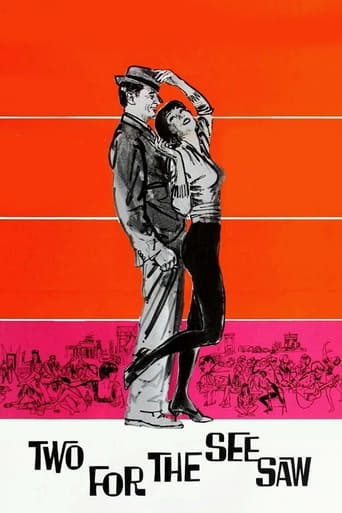

Two for the Seesaw is very heavy. It's one of those movies you watch once, appreciate the acting, and never want to see again.Robert Mitchum is getting a divorce, and in 1962, that's not a common occurrence. He picks up a loose dancer at a party, and in their mutual loneliness, they become really close really fast. Behind the scenes, Robert Mitchum and his leading lady Shirley MacLaine had an affair, and you can see the hurt and romance smoldering off the screen. Both actors do a fantastic job and handle a depressing script with realism rather than melodrama. Maybe it's because I knew they'd had an affair, but when they argued in the film, I almost felt embarrassed watching it, like I was intruding on a private argument. It's very powerful.However, it's a downer. It was based off a play, which is usually a clue that it's going to be depressing, and it absolutely is. Back in 1962, it wasn't common to make a movie about the highs and lows of one couple's relationship, as it is now. So, if you watch it, try not to compare it to its contemporaries and appreciate it on its own. Also, make sure you're in the right mood; if you're just coming out of a breakup, wait a while before renting it.
... View MoreTwo for the Seesaw is really the story of a second chance. An unlikely, difficult romance, between characters who have little in common, but their loneliness. You get that feeling ever since the sublime main titles, with Mitchum wandering in the black and white streets of New York. Later, Shirley MacLaine will also have a stylish, melancholy moment, when she practices ballet in a crummy, deserted studio. Jerry is a successful lawyer in Nebraska, who has never get around much, and now has lost everything, including the love of his wife Tess. He doubts his abilities to get by, both in a professional and personal point of view. Gittle, twenty-nine years old, is a divorced day-to-day dancer who'd like to open a class of her own. Behind her dreamy, charming smile, she hides failed relationships, forgotten ambitions and an ulcer. They meet quite by chance and decide to help each other, through their own frailties and struggles.Adapted from a play by William Gibson, the script offers many exteriors shots and several settings, but never quite believes in them. Sequences showing the protagonists outside, with other people are all very short, and the emphasis is put on their intimate confrontations, wherever they take place on the telephone or in one of their small flats. Text is evocative, a bit talkative even- and it describes the efforts both characters do to establish communication, and make some order in their mixed feelings. A special attention is made on the idea of giving : Jerry appears anxious to take care of someone, to regain self-esteem, while half-heartedly, he expresses his own needs for help. He also encourages generous Gittle to make a claim on him. But, the girl remarks, when two people love each other, why should they need to make any claim?Set in an atmospheric mood, in shadows of black, with beautiful Andre Previn score in the background, the film constantly drifts from raw, honest naturalism to a more sophisticated, classical drama. It's reminiscent of the New Wave (some scenes evoke Breathless) as well as Billy Wilder's The Apartment (MacLaine even goes to a Chinese restaurant) but the tone keeps a definitive identity until the very end. A bitter, feverish chronicle , it's the perfect illustration of an off-beat romance, with the awkwardness and the difficulty to understand each other coming over and ideal of mutual help. Frustrated in their feelings, the two leads are tempted by violence as a sure way of expression: Mitchum slaps his partner after a fight, and near the end, MacLaine seems eager to do the same with a cup. Gittle's illness, in the middle of the film, appears as a mean to reconcile them, and establish a kind of everyday routine, with Jerry finding back his sense of responsibility. But in fact, it drifts them further away: it seems Jerry can't bring himself to forget his ex-wife, and thus is unable to draw a line on his past. Gittle slow finding out of his nostalgia is really painful to watch. And the girl too, expects something more: a man, who will be completely hers. I couldn't help thinking of the Jack Lemmon character in The Apartment as a likely candidate for that.The conclusion, then, is that Jerry and Gittle were not made for each other. Still, it's not such a sad touch as it may seem. Both may reintegrate a well-planned universe they had hoped to get away from together, but it's their own decision. And they have discovered a lot of things about themselves, in the run of this relationship, that helped them advance and grow up. "He will be very grateful to you" Gittle says, of her future lover. "And her too", replies Jerry. "More than she'll ever know". A sad, messed-up romance it may be, but the farewells of the characters certainly are a success of maturity and empathy, beyond love. Directed by Robert Wise, in a stylish way, TFTS lies heavily on the shoulders of the leading performances. Mitchum and MacLaine happen to make a wonderful combination, with the right rate of instability, surprise and charm. An ordinary guy, shattered by his divorce and rather ill at ease in society, Jerry was an unusual part for Mitchum. His sad, tired gaze makes you believe in the scars of the man; and while he does not speak as loud as he should at times, he's distantly moving. MacLaine's Gittle apparently brings back a few memories of Fran Kubelik and Ginnie. She gives her a determined individuality, a radiant persona and her spontaneity, in the laughs and in the tears is so powerful it's bewildering. She's effortlessly touching and you buy her at once as the strongest of the couple. The supporting cast is hardly there at all, although one sees the shadows of Jerry boss in New-York, his two boheme friends, who have an arty flat and a high regard for matrimony, and of course the voice of his wife, Tess.MacLaine later revealed she had a three year affair with Mitchum, that began during the shooting. Usually, off-screen partners are not the best on a fictional level. Their own feelings make them awkward. But here, it is not the case. They have a terrific chemistry, and somehow, succeed in making you believe the story of Gittle and Jerry is how an ill-fated relationship should be lived. With classy honesty.
... View MoreRobert Mitchum lays a lawyer whose marriage back in Nebraska has just dissolved. Now, he's moved to New York and is very lonely. So lonely that he calls a woman (Shirley MacLaine) he barely knows. They go out and have a few laughs, then they go to her apartment. There, things move very quickly for a 1962 movie--surprisingly quickly, as he tries to get her to let him stay. At first, she's a bit put off--then she decides to sleep with him. At this point, however, he decides to leave--it's just moving too fast. Throughout the film the two are very open about sex and the dialog is quite gritty and realistic as well. Later, they even cohabitate--something you NEVER would have seen in the 1950s.Now these two people seem very, very different. Mitchum is well-spoken and a professional man from the Midwest. MacLaine is more a head-in-the-clouds Bohemian who is a Jewish New Yorker. Can two people THIS different fall in love and have it last? As you watch this film, you naturally assume the answer is no, as they just seem so unlike each other, argue an awful lot and what brings them together is difficult to put into words. In many ways, this odd relationship that defies the odds seems very reminiscent of THE WAY WE WERE (and you probably know how that film ended).Unfortunately, because the chemistry seems so odd in this film and the film is quite talky and stagy (it was originally a very successful Broadway play--and it shows), it's not a great film. Most of the problem is that although the dialog seems realistic, the combination of the two characters isn't. Why were they together in the first place other than they were lonely? And why did the movie seem to go on so long? So overall is it worth seeing? Perhaps, though this sure isn't a glowing recommendation.By the way, in a very disturbing scene, eventually Mitchum slaps MacLaine pretty hard. And, the way the film is made, it seems as if SHE drove him to it. Not exactly an enlightened scene and something that just seems wrong. And, not to be outdone, late in the film, she hits him as well!
... View MoreThere are no special effects, no graphic sex........just GREAT ACTING. I could watch movies like this all day and night. Shirley McLaine is at her best.......Robert Mitchum is........well...Robert Mitchum............did you know he smoked pot quite a bit? Anyway, give me two excellent actors and a great script over blowing up buses and the latest and greatest computer graphics any day. (ie; SHREK) I was home sick and forced to watch this, which is how i see many of my movies. two thumbs up. I think she(Shirley McLaine) was nominated for an Oscar for this or did she win an Oscar? I love good black and white movies. It engaged me from the beginning to the end.
... View More